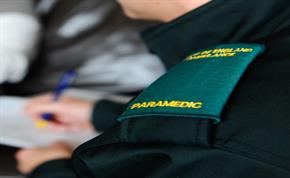Date:
19 April 2024
Page URL:
https://ntk.eastamb.nhs.uk/news/paramedics-wanted-for-new-cardiac-arrest-trial.htm?pr=
Paramedics wanted for new cardiac arrest trial

Do you want to be at the forefront of cardiac arrest research?
We’re on the hunt for a further 60 paramedics to take part in the new clinical Airways-2 trial, which compares the use of an i-gel airway device with tracheal intubation in out-of-hospital cardiac arrests.
Fully supported by the College of Paramedics, it’s the biggest pre-hospital airway management trial in the world – and you could be a part of it. If you’re a paramedic who carries out regular frontline A&E duties, you’re eligible to take part.
If you’re interested in joining our already 300-strong EEAST team, you can contact Research Paramedic Helen Hall for more information, helen.hall@eastamb.nhs.uk, or book yourself onto one of the upcoming training sessions:
- Wednesday, 4th November from 2-4pm, at Longwater depot
- Tuesday, 10th November from 11am-1pm, at Letchworth station
- Wednesday, 18th November from 11am-1pm, at Peterborough depot
- Tuesday, 24th November from 11am-1pm, at Weeley station
- Thursday, 26th November from 11am-1pm, at Southend station
- Tuesday, 1st December from 11am-1pm, at Barton Mills
Two hours of overtime, plus mileage, can be claimed for attending.
Why is this trial being done, and why is it important to the NHS?
At the moment, we don’t know the best way for NHS ambulance staff to provide rescue breathing during an out-of-hospital cardiac arrest.
Placing a breathing tube in the windpipe (tracheal intubation) has traditionally been considered the best method for providing ‘rescue breathing’ in this scenario. But, attempting to place the breathing tube can cause complications, as well as interruptions in chest compressions.
National recommendations suggest using a newer method of airway management - the insertion of a supraglottic airway device. This is a tube that sits on top of the voice box. They are already used during routine anaesthesia in hospital; in emergency care, they are quicker to insert and cause less interruption to chest compressions. However, a supraglottic airway device may not stay in place as securely as a breathing tube and, if a patient vomits, stomach contents may get into their lungs. There is real uncertainty amongst paramedicine and experts in the field about the best method to ensure a clear airway during the early stages of an out-of-hospital arrest.
So the Airways-2 trial aims to determine whether intubation, or a supraglottic airway device like the i-gel, gives the best chance of recovery to these patients. It is hoped that the results from this study will shape future cardiac arrest guidelines, and will yield real benefits to patients not just in the UK, but throughout the world.
Want to know more? Visit the official Airways-2 website for the latest news on the trial.
Published 29th October, 2015
